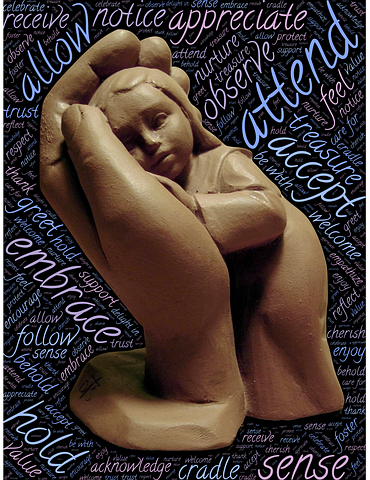Self-Judgment Versus Self-Compassion
By Dr. Margaret PaulDecember 31, 2006
A common underlying cause of anxiety, depression, addictive behavior and relationship problems is self-judgment. The antidote is self-compassion.
 We hear a lot about how important it is to be compassionate toward others, and it is very important. The problem is that you may not be able to really feel compassion toward others until you are able to feel compassion toward yourself.
We hear a lot about how important it is to be compassionate toward others, and it is very important. The problem is that you may not be able to really feel compassion toward others until you are able to feel compassion toward yourself.
In the many years that I've been doing counseling, I've discovered that the most common underlying cause of anxiety, depression, addictive behavior and relationship problems is self-judgment.
The most prevalent self-judgment is:
"I'm not good enough."
There are many variations to this core shame belief:
"I'm not lovable."
"I'm unworthy."
"I'm flawed."
"I'm not important."
"I'm bad."
"I'm a failure."
"I'm stupid."
"I'm not okay."
"I'm not enough."
However you phrase it, it is saying the same thing. It is a profound judgment against who you really are - your beautiful essence. And it is the opposite of self-compassion.
The moment we judge ourselves, we are telling ourselves that we have no good reasons for our feelings and behavior - that we are just not good enough. Yet our feelings and behavior always come from our belief system. When we are feeling badly and behaving in unloving ways toward ourselves and others, it is always because we are operating from false beliefs about ourselves and others.
If, instead of judging ourselves for our feelings and behavior, we were to move into compassion for ourselves, we would open the door to learning about the beliefs that are causing our pain.
What is your first response when someone blames you for something?
Do you judge yourself or judge the other person, or both? What happens when you judge yourself or the other person? The chances are that the interaction is not a healthy one.
What would happen if, when someone blames you for something, you opened to compassion for your feelings of being blamed?
Let's take an example of how different an interaction would be with self-compassion rather than self-judgment. In the following interaction, John attacks Mary for being over-drawn in their checking account. In the first example, Mary goes into self-judgment. In the second example, Mary goes into self-compassion.
John: "Mary, we are overdrawn in our account again because you forgot to enter some of the checks. What is the matter with you? Are you stupid?"
Mary: (Thinking to herself, 'I'm stupid, I can never do anything right,' she defends herself and attacks John.) "I just forgot. What's the big deal? I've been too busy taking care of your stuff. If you would do more around the house, I wouldn't forget things like that." Mary has abandoned herself.
John and Mary end up in a fight.
John: "Mary, we are overdrawn in our account again because you forgot to enter some of the checks. What is the matter with you? Are you stupid?"
Mary: (Tuning in to how badly it feels to be attacked by John, she has compassion for her own feelings of sadness and loneliness at being attacked by someone whose love is important to her.) "John, this feels awful inside. My stomach hurts when you attack me like this. I'm willing to talk with you about the checkbook, but not when you are attacking me. Please let me know when you are ready to talk with me about this without blaming me."
Because Mary moved into compassion for her own feelings, she was able to respond to John in a way that was loving to herself and to him.
Moving out of self-judgment and into self-compassion takes much Inner Bonding practice. Most of us have been practicing self-judgment for so long that it has become our automatic way of being. It takes much consciousness to move into self-compassion - much practice with Step One of Inner Bonding - but with practice you can move out of abandoning yourself and into being loving to yourself.
Join Dr. Margaret Paul for her 30-Day at-home Course: "Love Yourself: An Inner Bonding Experience to Heal Anxiety, Depression, Shame, Addictions and Relationships."
Join IBVillage to connect with others and receive compassionate help and support for learning to love yourself.
 Send this article to a friend
Send this article to a friend  Print this article
Print this article  Bookmarked 15 time(s)
Bookmarked 15 time(s)
| Related Articles |
|---|
| Judge, Jury, and Executioner |
| Are You Addicted to Negative Thinking? |
Comments
| Author | Comment | Date |
|---|---|---|
| Join the Inner Bonding Community to add your comment to articles and see the comments of others... | ||

Daily Inspiration
We experience moments of enlightenment when we let go of trying to control that which we can't control and are fully present to and guided by Spirit in this moment. Being conscious means that you are aware of making this choice to control or surrender to Spirit. Today, attempt to be conscious of which choice to you are making.
By Dr. Margaret Paul

 Share with Del.icio.us
Share with Del.icio.us Share with Digg
Share with Digg







